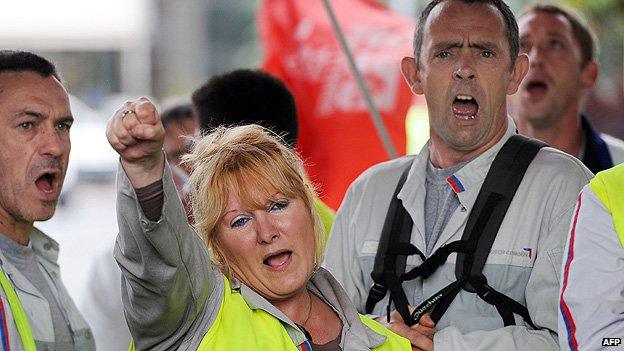Francois Hollande's 'Change Now' becomes 'Be Patient'
- Published

Workers at French car-maker Peugeot oppose recent plans to cut thousands of jobs in the company
Francois Hollande was elected to the French presidency on a pledge to reverse France's rising unemployment but, two months on, he is facing some major setbacks.
Alice works in one of the last surviving textile factories in the gritty industrial belt of northern France, near Valenciennes.
Thirty-seven years ago, when she was taken on, the group that owns the factory employed about 8,000 people. Now, only 200 jobs are left. Alice, who is now in her 50s, says the group is still making the same products - but not in France. They are made in countries where labour is cheaper.
For 20 years, she says, she has heard politicians promising to do something to stop industry moving abroad but it was just talk. And she reluctantly accepts that Francois Hollande and the new Socialist government in France cannot exert as much control as they would like over industry and international business.
They are discovering that they can do little to stop the car-maker Peugeot from closing a factory just outside Paris. The government is threatening to cut state aid to the ailing company, but executives argue that will only make things worse for workers. And yet beneath the combative rhetoric of the left-wing unions, I have found that many people are as resigned as Alice to the idea of a future with fewer manufacturing jobs in France.
"It's depressing," says Jacky, a worker at the Peugeot plant. "Obviously we're angry," he adds, smoking furiously. "But it would have happened anyway, whoever was in power."
Another worker, Christian, says: "We didn't expect miracles but we do want Hollande to do something. We're worried about ourselves, and we're even more worried about our children's future."
I met the two men in a suburb a few miles from the factory, on the day management announced the plan to phase out production there over the next two years. We went to a cafe, where Jacky ordered brandy and Christian ordered beer.
"It's been a long, bad day," they say, as they raise their glasses. Both are in their late 40s with children still at school, and until now they have enjoyed a decent quality of life.
"We're too young to retire," they say. "But maybe we're too old to retrain." They are hoping the government will manage to force Peugeot to back down, but they say they are prepared for the worst.
President Hollande's campaign slogan was "change is now" but, since he has been in office, another catchphrase has started to be heard more often. It is one inherited from the previous Socialist president, Francois Mitterrand - "Donner du temps au temps". It roughly translates as "all in due course" or "be patient, don't rush things".
Many of those who signed up for "change now" are none too happy about being told to be patient. One of the first campaign pledges the government fulfilled was to raise the minimum wage. But the increase met with derision from many union members. They calculated that it would only add up to a few extra euros a month, after tax.
"It's not even enough to buy a baguette a day," snorts Jacky.
At the same time, Mr Hollande's plan to sharply increase taxes on the super-rich and big companies has angered those who argue that it will lead to capital flight and a brain-drain to countries like Britain or Belgium.
I spoke to a group of architects in their 30s and 40s. On the face of it, they are doing quite well. The last thing any of them wants to do is leave France.
Most of them, in fact, voted for Mr Hollande but, like a lot of other middle-class people, they are starting to feel uneasy about the impact of higher taxes on their business.
They want more social justice but they also want the government to recognise that French companies have to be able to compete internationally.
So what do they want Mr Hollande to do?
One of them, a woman called Murielle, says he would do well to remember that, after two years of left-wing policies which did not work in the 1980s, Mr Mitterrand did a U-turn, becoming less radical and more friendly to business.
That, she says, led to a period of comparative prosperity. Mr Hollande will do the same, she predicts.
"There's really no choice," she said. "It's only a question of time."
<bold>How to listen to From Our Own Correspondent:</bold>
<bold>BBC Radio 4: </bold>A 30-minute programme on Saturdays, 11:30 BST.
Second 30-minute programme on Thursdays, 11:00 BST (some weeks only).
<link> <caption>Listen online</caption> <url href="http://www.bbc.co.uk/programmes/b006qjlq" platform="highweb"/> </link> or <link> <caption>download the podcast</caption> <url href="http://www.bbc.co.uk/podcasts/series/fooc" platform="highweb"/> </link>
<bold>BBC World Service:</bold>
Hear daily 10-minute editions Monday to Friday, repeated through the day, also available to <link> <caption>listen online</caption> <url href="http://www.bbc.co.uk/programmes/p002vsng" platform="highweb"/> </link> .
Read more or <link> <caption>explore the archive</caption> <url href="http://news.bbc.co.uk/1/hi/programmes/from_our_own_correspondent/archive/default.stm" platform="highweb"/> </link> at the <link> <caption>programme website</caption> <url href="http://news.bbc.co.uk/1/hi/programmes/from_our_own_correspondent/default.stm" platform="highweb"/> </link> .
- Published20 July 2012